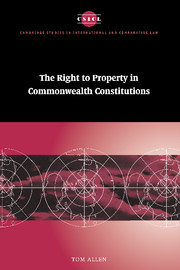Book contents
- Frontmatter
- Contents
- Table of cases
- Acknowledgements
- 1 Introduction
- 2 The right to property at common law
- 3 The development of written rights to property
- 4 Constitutional interpretation
- 5 The meaning of property
- 6 Acquisition and deprivation
- 7 Public purpose
- 8 Compensation
- Bibliography
- Index
- CAMBRIDGE STUDIES IN INTERNATIONAL AND COMPARATIVE LAW
1 - Introduction
Published online by Cambridge University Press: 28 July 2009
- Frontmatter
- Contents
- Table of cases
- Acknowledgements
- 1 Introduction
- 2 The right to property at common law
- 3 The development of written rights to property
- 4 Constitutional interpretation
- 5 The meaning of property
- 6 Acquisition and deprivation
- 7 Public purpose
- 8 Compensation
- Bibliography
- Index
- CAMBRIDGE STUDIES IN INTERNATIONAL AND COMPARATIVE LAW
Summary
It is difficult to imagine a state without stable rules regarding the allocation of resources. At the same time, the content and nature of these rules are as changeable as the economic, social and political circumstances in which they operate. A successful state must therefore recognise the institution of property, while also recognising the need to modify property rules and distributions in appropriate circumstances. In practical terms, the state must have the power to take, tax and regulate property without the consent of individual property owners, but the exercise of these powers must be subject to some sort of restraint.
This book concentrates on the constitutional law regarding the compulsory acquisition of property in the Commonwealth. Most Commonwealth countries include a right to property in a constitutional bill of rights. These rights generally provide that property may not be acquired compulsorily except for a public purpose and upon payment of adequate compensation. The framing and interpretation of these rights to property raise a number of common issues across the Commonwealth, and this book seeks to describe the main issues and the different ways in which framers and judges have addressed them.
In the Commonwealth, comparative law has always played an important role in legal development. The use of comparative law in Commonwealth courts can be traced back to the colonial era, when the Privy Council held that a single common law applied to all common law jurisdictions in the Commonwealth, except as specifically varied by legislation.
- Type
- Chapter
- Information
- The Right to Property in Commonwealth Constitutions , pp. 1 - 12Publisher: Cambridge University PressPrint publication year: 2000
- 14
- Cited by

